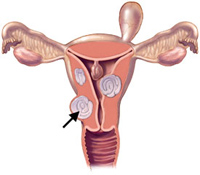Health > Womens Health >Fibroids
Fibroids
Uterine leiomyomas, commonly known as fibroids, are well-circumscribed, non-cancerous tumors arising from the myometrium (smooth muscle layer) of the uterus. In addition to smooth muscle, leiomyomas are also composed of extracellular matrix (i.e., collagen, proteoglycan, fibronectin). Other names for these tumors include fibromyomas, fibromas, myofibromas, and myomas.

Fibroids may require treatment in the following circumstances:
Fibroids are growing large enough to cause pressure on other organs, such as the bladder.
Fibroids are growing rapidly
Fibroids are causing abnormal bleeding
Fibroids are causing problems with fertility.
Leiomyomas are classified by their location in the uterus.
Fibroids that are inside the cavity of the uterus will usually cause bleeding between periods . Subserosal leiomyomas are located just under the uterine serosa and may be pedunculated (attached to the corpus by a narrow stalk) or sessile (broad-based). Intramural leiomyomas are found predominantly within the thick myometrium but may distort the uterine cavity or cause an irregular external uterine contour. Submucous leiomyomas are located just under the uterine mucosa (endometrium) and, like subserosal leiomyomas, may be either pedunculated or sessile. Tumors in subserosal and intramural locations comprise the majority (95%) of all leiomyomas; submucous leiomyomas make up the remaining 5%.
Symptoms of Fibroids : The most common complaints of women with fibroids are pressure symptoms and heavy periods. An enlarged womb will place pressure on the bladder giving increased urinary symptoms (eg. frequency), and can cause back ache, lower abdominal discomfort and pain on intercourse. Fibroids can cause very heavy periods, leading to iron-deficiency anaemia. They don't cause disturbance to the menstrual cycle itself - typically the bleeding is regular but much heavier than usual. The periods may be more painful than usual.
Prevention: As the cause of fibroids is still unknown, there are no clear guidelines for preventing them. However, there are some things you could do that may help reduce your risk:
*Keep your weight in check. This will minimise oestrogen levels in your body.
*Eat green vegetables and fruit, and avoid red meat. An Italian study found that women who eat little meat but a lot of green vegetables and fruit seem to be less likely to develop fibroids than women who eat a lot of red meat and few vegetables.
*Some studies suggest the birth control pill may protect against fibroids by keeping hormone levels from peaking and falling.
|

